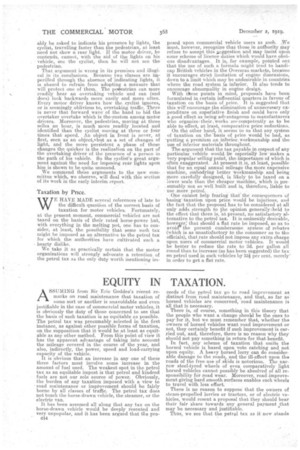Taxation by Price.
Page 2

If you've noticed an error in this article please click here to report it so we can fix it.
E HAVE MADE several references of late to the difficult question of the correct basis of taxation for motor vehicles. Fortunately, at the present moment, commercial vehicle§ are not taxed on the basis of their rated horse-power but, with everything in the melting pot, one has to consider, at least, the possibility that some such tax might. be imposed as an alternative to the petrol tax for which the authoeities have cultivated such a hearty dislike. We take it as practically certain that the motor organizations will strongly advocate a. retention of the petrol tax as the only duty worth mentioning jet posed upon commercial vehicle users as such. We must, however, recognize that those in authority May refuse to accept this eaggestion and may insist Upon some scheme of licence duties which would have obvious disadvantages. It is, for example, pointed out that the iise of such a formula might tend to handicap British vehicles in the Overseas markets, because it encourages strict limitation of engine dimensions, down to a limit WhiCh may be undesirable in countries where the road. system is inferior. It also tends to encourage abnormality in eng.ine design. With tkese pointa in mind, proposals have been formulated in cartain influential quarters in fa.vour of taxation on the basis of price. It is suggested that this will-encourage .the elimination of unnecessary expenditure ore supeilative finish and could have only a good .effect as being advantageous to manufacturers who organize ,their ,works .sor competently as to be able to effect, at least, comparative price redactions. On the other hand, it seems to us that any system of taxation on the 'basis of price would he bad, as putting a premium on inferior:. workmanship and the use of inferior materials throughout. The argument that the tax payable in respect of any particular, Vehicle would especially low -makes a very populateselling point, theiniportance of which is eften exaggerated. At present iteS, at least, possible that for an equal annual mileage the more -expensive machine, embodying better 'Workmanship, and being more carefully designed, is likely to 'be taxed on a lower scale than the cheaper machine, which is presuinahly riot so well ,built -and is, therefore, liable to use more, petrol. . . . One cannot help fearingthatthe consequences of basing taxation upon price would be injurious, and the fact that the proposal has to be considered at all only adds .strength 'to the opinion generallyiheld to the effect that there is, at present, no satisfactory alternative to the petrel tax. It is eminently desirable, hoWexer; that should a flat rate be imposed, -SO as to avoid' the present cumbersome eysteur of rebates (which is as unsatisfactory to the as to the officials), that rate should not impose any extra charge upon users of commercial motor vehicles. It would be better to reduce the rate to Sci.. per gallon all round than to increase (as has been suggested) the tax on petrol used in such vehicles by 34 per cent. merely in order to get a flat rate.


























